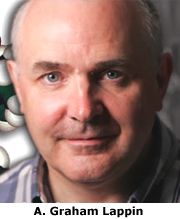
University of Notre Dame organic chemist A. Graham Lappin, a prodigious researcher and the longest-serving chair of chemistry and biochemistry in memory, has been selected by his peers as the recipient of the 2007 Faculty Award. Lappin was honored Tuesday (May 22) during the annual President’s Dinner.
“His record of research and scholarship since joining the University in 1982 is matched by his passion for teaching and dedicated service to his department and to Notre Dame,” the award citation reads.
Lappin’s primary research area is mechanistic inorganic chemistry with special attention to the design of novel chiral ligands and investigations into new magnetic materials. His work is supported by foundations and federal agencies alike. He is in his fourth term as chair of the department. A 2004 Kaneb Teaching Award winner, he remains dedicated to developing excellent teachers, leading workshops on such topics as the importance of diversity inside the classroom and out.
Also Tuesday, three faculty members — Leo Burke, Donald Crafton and Barbara Turpin — received President Awards. Nominations for this honor are made by faculty.
Burke “has taken the Executive MBA program from a regional Midwestern offering to one that is international in scope and ranked among the top 20 programs globally,” his citation reads. The associate dean of the Mendoza College of Business also designed the Executive Integral Leadership Program, which cultivates personal leadership development. “He exemplifies grace in action and embodies the spirit of NotreDame,” the citation adds.
Crafton, a professor of film, television, and theatre and chair of the music department, is a distinguished scholar of film history and animation whose recognitions include honors from the Academy of Motion Picture Arts and Sciences. “A passionate, innovative instructor,” his citation reads, “he has led significant curricular and administrative developments, mentored a number of promising students to pursue graduate study, and developed and taught new research courses for seniors, for which he received sterling student reviews.”
Turpin most recently facilitated the Graduate School’s first Commencement exercises. The associate dean for academic programs and policies is lauded for her work coordinating the National Research Council survey, “achieving one of the highest response rates in the country,” her citation reads. The 17-year veteran facilitated the graduate and professional student life survey, coordinated revisions to the Graduate School Bulletin and coordinated the committee to develop guidelines for reviews of departments, centers and institutes.
A faculty member acknowledged at the President’s Dinner also was honored at Saturday’s Graduate School Commencement. Julia F. Knight received the 2007 Rev. James A. Burns, C.S.C., Graduate School Award for teaching excellence and exemplary graduate education support. She has directed graduate studies for mathematics since 2003 and has been described as “the guardian angel of young logicians.”
Other recipients of annual excellence awards are:
- Thomas C. Corke, founding director of the Center for Flow Physics and Control, received the 2007 Research Achievement Award for his significant contributions to the study and understanding of fluid mechanics that have resulted in $8 million in research funding and significant industrial partnerships. His book on the design of aircraft is the capstone design text in 12 aerospace departments across the country.
- Philosopher Gary M. Gutting and physicist Christopher F. Kolda, received the Thomas P. Madden Award for outstanding teaching of freshmen. A classroom instructor for more than four decades, Gutting’s “willingness to build his lectures around the questions they submit gives students a remarkable amount of responsibility for their education,” his citation reads. Kolda, at home teaching both graduate-level and introductory physics, has spent the past several years “enlivening” instruction for first-year students in the Arts and Letters/Science Honors Program.
- Georges Enderle, received the Reinhold Niebuhr Award. The John T. Ryan Jr. Professor of International Business Ethics “inspires and instigates consideration of corporate freedom and responsibility” throughout the world as co-founder of the European Business Ethics Network. Enderle also has been instrumental in introducing the debate about business ethics to the People’s Republic of China.
- Laura S. Fuderer, received the Rev. Paul J. Foik, C.S.C., Award for exemplary contributions by a librarian. “She has been instrumental in building the University’s reputation as a major resource for scholars through her work in acquisitions, drafting collection development proposals, and supporting special faculty initiatives,” the citation reads. Fuderer, a 25-year veteran of the University, is known for her success in building the French-language collection and her exceptional collaborative skills.
- Rev. Paul F. Doyle, C.S.C., received the Rev. John “Pop” Farley, C.S.C., Award. The rector of Dillon Hall has become a legend with such innovations as “Milkshake Masses.” He also is chaplain to the Mendoza College of Business and various athletic teams. The Farley Award is presented by student affairs to honor a person outside the classroom who enriches the religious, disciplinary, social, recreational and physical welfare of students.
- Rev. Robert S. Pelton, C.S.C., received the Grenville Clark Award. The theologian and Kellogg Institute Fellow has pursued local and global causes ofpeace and human rights for more than 50 years and “with indefatigable determination and commitment.” His is one of the University’s most frequent researchers in Cuba and was an invited delegate to witness the pope’s recent visit to Brazil. The Clark Award honors volunteer activity and public service that advances the causes of human rights.
- James P. Paladino, received the Rev. William A. Toohey, C.S.C., Award for Social Justice. Paladino was lauded for his “exemplary” dedication to providing service-learning opportunities. His gentle and caring nature “inspires students, and co-workers, in their concern and quest for the common good.” As associate director of programs and resource administrator, Paladino “marshals resources so that as many people and organizations as possible can be served.”
Originally published by at newsinfo.nd.edu on May 25, 2007.